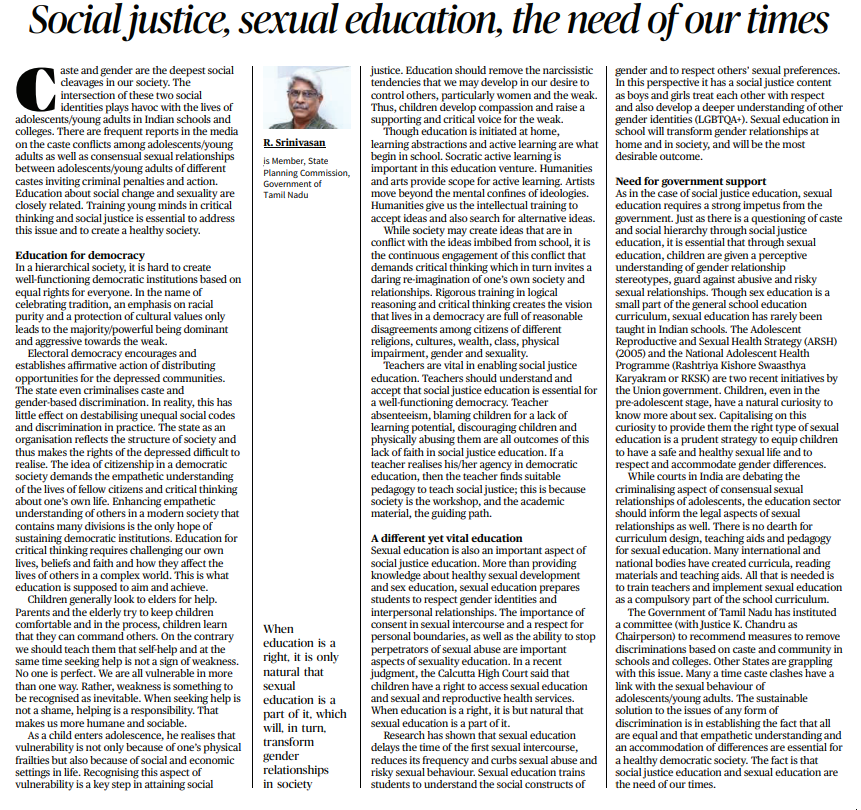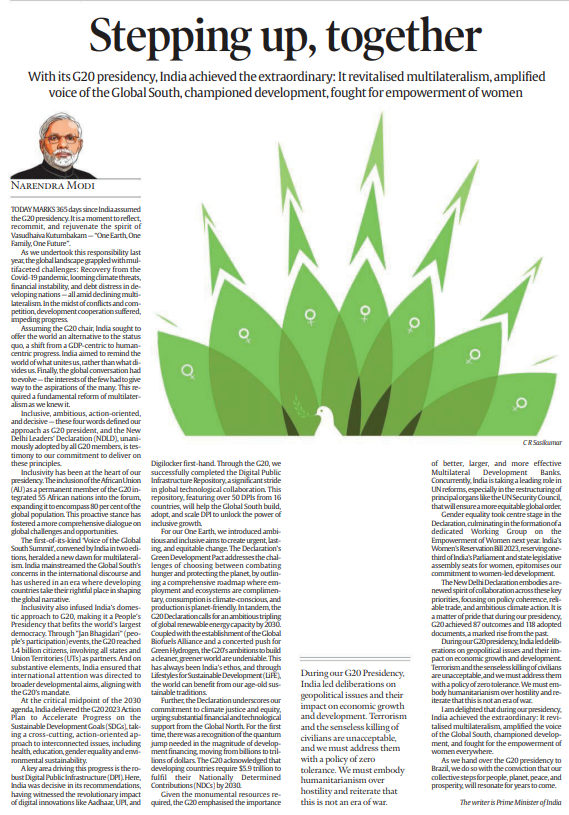Introduction
Caste and gender, identified as the deepest social divisions in Indian society, significantly impact the lives of adolescents and young adults within educational settings. The intersection of these social identities often leads to conflicts and criminal repercussions, emphasizing the urgent need for comprehensive education on social change and sexuality.
Education for Democracy
In a hierarchical society, the challenge lies in establishing democratic institutions that uphold equal rights. Traditional values emphasizing racial purity hinder equal opportunities, perpetuating dominance by the majority. While electoral democracy supports affirmative action, criminalizing discrimination has limited impact, highlighting the necessity of education fostering empathetic understanding and critical thinking for a sustainable democratic society.
Adolescence and Vulnerability
As children transition to adolescence, they realize vulnerability extends beyond physical frailties to encompass social and economic aspects. Education should counter narcissistic tendencies, instilling compassion and a supportive voice for the weak. Active learning, especially in humanities and arts, fosters critical thinking, challenging societal norms and encouraging a re-imagination of relationships.
Role of Teachers
Teachers play a vital role in social justice education, requiring a deep understanding of its importance in a functioning democracy. Teacher engagement, pedagogical approaches, and recognition of their agency are crucial in shaping a socially just educational environment.
Sexual Education for Social Justice
Sexual education is integral to social justice education, offering more than just information on healthy sexual development. It promotes respect for gender identities, interpersonal relationships, consent, and personal boundaries. Government support is crucial in integrating sexual education into the school curriculum to challenge gender stereotypes, prevent abusive relationships, and foster a healthier societal attitude towards sexuality.
Need for Government Support
Government support, akin to initiatives addressing social justice, is imperative for effective sexual education. Despite existing curricula and teaching aids, the lack of implementation necessitates training teachers and making sexual education a compulsory part of school curriculums. Initiatives like the Adolescent Reproductive and Sexual Health Strategy and the National Adolescent Health Programme underscore the government’s role in this regard.
Conclusion
Addressing issues of discrimination, be it based on caste or gender, requires acknowledging equality and promoting empathetic understanding. Social justice education and sexual education emerge as imperative components of modern education, ensuring a healthy and inclusive democratic society. The government’s active role is crucial in implementing comprehensive educational strategies to combat deep-seated social cleavages.
Introduction:
The editorial discusses two routes for women’s political empowerment: legislative reservation and party-level quotas. Examples from neighboring countries like Nepal, Bangladesh, and Pakistan demonstrate the effectiveness of these approaches.
Global and Indian Scenarios:
- Examining global examples, countries like Australia, Canada, South Africa, and Sweden have achieved significant women representation without legislatively-backed quotas.
- In India, the long-standing debate on women’s political representation led to the passage of the 33% reservation bill in 2010, finally enacted in 2023 by the NDA government.
Assembly Elections and Ticket Distribution:
- Despite the landmark legislation, the analysis of recent Assembly elections reveals a disparity in political commitment.
- Both national and regional parties fall short of the mandated 33% mark in providing tickets to women candidates.
- This raises questions about parties’ genuine dedication to empowering women as legislators, as they seem more focused on women as voters.
Case Studies:
- Case studies from Madhya Pradesh, Telangana, and Uttar Pradesh highlight the reluctance of political parties to meet the 33% quota, even when they have the opportunity.
- The example of the Congress party reserving 40% of seats in the 2022 UP Assembly elections emphasizes the potential impact of bold initiatives.
Success Stories and Discouraging Signals:
- Instances from Odisha and West Bengal elections, where BJD and TMC fielded more female candidates and achieved success, contrast with the discouraging signal from national and regional parties.
- The editorial questions why parties hesitate to increase the number of women contestants even after the enactment of the 2023 reservation law.
Future Challenges and Delimitation Linkage:
- While applauding the enactment of the Women Reservation Act 2023, the note raises concerns about its practical implementation, especially in light of the delimitation process scheduled after 2026.
- Despite successful endeavors by regional parties, the lack of commitment from national parties post-legislation signals a challenge to women’s political empowerment.
Conclusion:
While legislative measures are crucial for women’s political empowerment, the note highlights the importance of genuine commitment from political parties in implementing these measures.
The editorial analysis suggests that the success of such initiatives depends on political will and goes beyond legal frameworks, raising questions about the sincerity of efforts to empower women in the political arena.
One Year Reflection: India's G20 Presidency
Introduction:
Today marks the completion of 365 days since India assumed the G20 presidency.
This milestone prompts a reflection on the challenges faced globally and the efforts made to address them under India’s leadership.
The overarching theme has been to shift from a GDP-centric to a human-centric approach, fostering inclusivity and redefining the narrative of multilateralism.
Global Landscape Challenges:
India took on the G20 chair amidst a complex global landscape characterized by the aftermath of the Covid-19 pandemic, climate threats, financial instability, and issues of debt distress in developing nations. The period also witnessed a decline in multilateralism, hindering development cooperation.
Vision and Principles:
India aimed to offer an alternative to the status quo by emphasizing inclusivity, ambition, action orientation, and decisiveness. The New Delhi Leaders’ Declaration (NDLD) stands as a testament to India’s commitment to these principles.
Inclusivity:
Inclusivity was a cornerstone of India’s G20 presidency. The integration of the African Union as a permanent member expanded the forum’s reach to 80% of the global population. Initiatives like the ‘Voice of the Global South Summit’ underscored India’s commitment to mainstreaming the concerns of developing nations in the international discourse.
Domestic Inclusivity:
India’s approach domestically was marked by “Jan Bhagidari” events, engaging 1.4 billion citizens and aligning with the G20’s developmental mandate. The G20 2023 Action Plan focused on accelerating progress on the Sustainable Development Goals (SDGs).
Digital Public Infrastructure (DPI):
India’s decisive stance on Digital Public Infrastructure led to the creation of the DPI Repository, showcasing over 50 DPIs from 16 countries. This initiative aims to unlock the power of inclusive growth globally.
Green Development and Climate Action:
The Green Development Pact outlined in the Declaration addresses the balance between combating hunger and protecting the planet.
The G20’s commitment to tripling global renewable energy capacity by 2030, the Global Biofuels Alliance, and efforts towards Green Hydrogen reflect a dedication to building a cleaner, greener world.
Climate Justice and Equity:
The Declaration highlights India’s commitment to climate justice, urging substantial financial and technological support from the Global North.
Recognition of the need for trillions of dollars to fulfill Nationally Determined Contributions (NDCs) by 2030 reflects a pragmatic approach.
Gender Equality:
The Declaration puts a spotlight on gender equality, leading to the formation of a dedicated Working Group on the Empowerment of Women. India’s Women’s Reservation Bill 2023, reserving one-third of legislative seats for women, exemplifies a commitment to women-led development.
Achievements and Impact:
India’s G20 presidency achieved 87 outcomes and 118 adopted documents, signaling a significant rise from the past. The revitalization of multilateralism, amplification of the Global South’s voice, championing development, and advocating for women’s empowerment were central accomplishments.
Conclusion:
As India hands over the G20 presidency to Brazil, it does so with the conviction that the collective efforts for people, planet, peace, and prosperity will resonate for years to come. The year-long tenure reflects a renewed spirit of collaboration and policy coherence in addressing global challenges.





